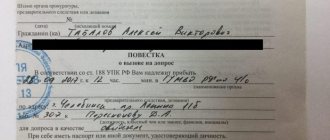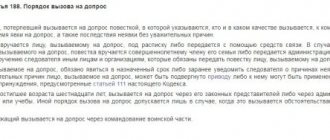A minor under 16 years of age can be summoned for questioning through his parents or educational institution. Notification of the interrogation may come in the form of a summons or by telephone. The agenda will display two names: the child's and the adult's.
If you believe that your child may be in danger, be sure to send him or her for questioning to a qualified defense lawyer - a juvenile defense lawyer.
Do you want to figure it out, but don’t have time to read the article? Lawyers will help
Entrust the task to professionals. Lawyers will complete the order at the cost you specify
76 lawyers on RTIGER.com can help with this issue
Solve the issue >
Who is eligible to attend?
The interrogation is carried out by investigative authorities in order to obtain oral information about the offense committed. Correctly constructing a conversation with a witness is not an easy task. The situation becomes more complicated if a minor citizen is interrogated. Children remember vivid details and moments well, but are not always able to verbalize information.
The basic rules for conducting interrogation at different stages of the investigation are explained in the Criminal Procedure Code of Russia:
- Art. 191 of the Code of Criminal Procedure of the Russian Federation - preliminary investigation;
- Art. 280 of the Code of Criminal Procedure of the Russian Federation - during a court hearing;
- Art. 425 of the Code of Criminal Procedure of the Russian Federation - interrogation of the accused, suspect.
An important condition is that the minor is summoned to the investigator through the child’s legal representatives, the list of which is contained in Article 5 of the Code of Criminal Procedure of the Russian Federation : parents; guardians (trustees); adoptive parents; orphanage administration. Representatives independently decide whether they will be present at the inquiry procedure.
When issuing a summons to appear, the investigator needs to analyze the advisability of inviting a specific legal representative. If there is a possibility that the actions of an adult infringe on the rights of a teenager, then a decision is made to replace the representative. What factors are considered:
- suspicion that the parents will persuade the child to give false testimony;
- victims of a sexual crime are ashamed to describe the details of what happened in front of their relatives;
- the presence of a loved one embarrasses the child, he is distracted, constantly waiting for the adult’s reaction to his words;
- the parents are suspected of abusing a minor or committing sexual molestation.
A teacher or psychologist must be present during the interrogation of a child under 14 years of age. If the teenager is between 14 and 18 years old, then a specialist is invited at the discretion of the investigator or judge. The exception is the psychological state of the person being interrogated: if a child suffers from a mental disorder or is developmentally delayed, then the presence of a psychologist is mandatory for any age.
How can a specialist help during interrogation? First of all, it is designed to establish contact with the teenager, as well as to suppress possible psychological pressure from the investigator or relatives. In addition, teachers provide consulting services regarding communication with minors in cases of sexual molestation.
The investigation may face the fact that the child lives independently, and his parents are deprived of parental rights. In this case, a representative of the local guardianship council must be invited to the interrogation. The inspector is obliged to ensure that the teenager’s rights are strictly observed.
First conversation
It can become the main and decisive one if the employee manages to obtain complete and objective information about the incident.
It is advisable to begin the interrogation of a minor suspect with questions about living conditions, characteristics of study or work, range of interests, and hobbies. The teenager, thinking that this information is not relevant, may respond willingly.
After finding out the biographical data, the investigator must explain in detail and clearly to the minor what crime he is suspected of.
Each question must be formulated correctly. They should not contain factual information that could suggest something to a minor. Questions should be simple and specific.
Receiving a call
It is prohibited to hand over a summons to appear for questioning to a teenager in person. His legal representatives or the administration of the institution where the child is being raised have the right to receive a summons.
The summons is addressed to the legal representative, while indicating the name of the minor. In exceptional situations, when a case of child abuse has been opened and it is undesirable to notify the parent, the summons is served on another person. For example, a grandmother or a teacher.
If a teenager is suspected of committing a crime and is taken into custody, a summons for questioning is sent to the head of the pre-trial detention center. Parents receive a separate summons indicating the place and time of the inquiry. They have the right to appear in the investigator's office to attend the procedure.
Preparation
When preparing for the procedure for taking evidence, the investigator/interrogating officer is obliged to take into account the procedural status of the citizen and information characterizing his personality. This information is important in determining the circle of persons allowed to participate in the procedural action, the time, place of interrogation, as well as the most appropriate tactics and methods of calling.
The authorized officer must collect at least minimal information about the teenager. For this purpose, the legal representatives of the minor suspect - parents, adoptive parents, guardians - are interviewed. Neighbors and teachers can provide important information. In some cases, the local commissioner is interviewed.
Location
Minors 14-18 years old are called into the investigator’s office, because in this way the importance of the procedure is emphasized. An official setting encourages a teenager to give truthful information.
Features of tactics
One of the tactics is to maximally specify the circumstances of the act and the accomplices. To do this, the investigator finds out the circumstances that took place before the assault, the actions of the participants, and the features of their relationships. It is important to establish the moment of intent and identify the initiator.
If a minor admits guilt, but is confused about the details, you need to figure out why this is happening. The reason may be the peculiarities of psychophysiological properties. Often teenagers are confused in their testimony due to strong emotional arousal, developmental delay, etc. In some cases, a minor reports information that has become known to him from other sources.
During the interrogation, it is necessary to determine the role of adults or other accomplices. To do this, the investigator should focus the teenager’s attention on different circumstances, ask questions prepared in advance and formulated during the conversation related to relationships with adults.
Duration of interrogation
The law does not stipulate the question of at what age it is permitted to involve children in investigations. Of course, if a witness or victim is a child who has not yet learned to speak, then there can be no question of interrogation. Regarding children 3-4 years old, the investigator makes a decision individually. Basically, authorized bodies try to find older witnesses to a crime.
The carrying out of investigative actions cannot exceed:
- if the child is under 7 years old - half an hour without a break;
- from 7 to 14 years - 1 hour without a break, total time - 2 hours a day;
- from 14 to 16 years old - 2 hours without a break, total time - 4 hours a day.
The interrogation must be carried out “hot on the heels”, because children are very impressionable. New events quickly overshadow everything experienced before. Especially if the incident did not cause a sharp outburst of emotions in the child. The investigator, sometimes with the help of a psychologist, draws up a conversation plan and formulates unambiguous, understandable questions.
Other techniques
If the minor does not admit guilt, in addition to tactical methods, other methods of finding out information are used. The investigator must clearly explain to the teenager the danger of his actions to society and characterize the attitude of those around him. Of considerable importance is the description of the damage that the minor caused not only to the victim, but also to his loved ones.
The investigator must show what denial of guilt can lead to, the importance of the teenager’s correct assessment of his behavior, the consequences, and the need to cooperate with the investigation. It should be explained to the minor that a sincere confession is a factor mitigating the punishment.
Conducting an interrogation
Investigative actions begin with the investigator drawing up a resolution indicating the circumstances of the crime and the status of the child. For example, a victim in a criminal case. At the same time, a decision is made to appoint a legal representative who will accompany the minor during all investigative activities.
Interrogating a teenager is no different from a similar procedure with adults. The only peculiarity is that children under 16 years of age are not warned about liability for giving false information, as well as for refusing to testify ( Part 2 of Article 191 of the Code of Criminal Procedure of the Russian Federation ). The investigator simply points out the need to tell the truth.
Procedure for conducting an inquiry:
- clarification of the rights of the person being interrogated;
- recording the data of those present in the protocol;
- the minor tells his vision of events;
- the investigator asks questions;
- the interrogation participants sign the protocol (if the child is very young, then the signature of his legal representative is sufficient).
The law obliges investigators to videotape the interrogation. Subsequently, the video materials are added to the case materials. It will be possible to resort to them during further proceedings in court. However, the child himself or his legal representative has the right to refuse video recording of the inquiry. This must be noted in the protocol.
Detailing information
If during the investigation a minor admits to an act and is ready to talk about it in detail, the investigator must find out every circumstance and analyze all the information he receives from the teenager. It is necessary to detail the facts as much as possible. If possible, they should be recorded verbatim in the interrogation record.
Information obtained during the conversation must be verified. The investigator/interrogator must clearly determine whether the teenager is really guilty of the crime or whether he made up information. If the testimony turns out to be reliable, it will allow us to establish new data, find property stolen during the crime, accomplices, weapons, etc.
Confidentiality of information
The Criminal Code of the Russian Federation prohibits the dissemination of information about children who have suffered as a result of a crime. The ban applies to any information: personal data, photographs, video materials, voice recordings. It is especially important to maintain confidentiality when a minor has been the victim of sexual assault. By introducing such restrictions, legislators pursued one goal - to protect the child from attacks from the environment and ridicule of peers.
Failure to comply with the ban entails serious consequences: from a fine (150-350 thousand rubles) to imprisonment for a period of 5 years. According to Part 3 of Article 137 of the Criminal Code of the Russian Federation, public speaking or publication of facts in the media can serve as illegal dissemination of information.
Interrogation in a criminal case
The law allows not to re-examine a minor witness. Basically, judges conduct proceedings based on materials collected by the investigator. Such norms are completely justified: in the courtroom, in addition to many strangers, there is a defendant.
If the court decides to re-interrogate, then the attendance of the child’s legal representative at the hearing is mandatory. Adult participants in the process must create a calm environment. The duration of the process does not exceed the time established by Art. 191 Code of Criminal Procedure of the Russian Federation . Usually the judge allows no more than an hour for interrogation, so as not to cause psychological trauma to the child.
Basic moments:
- A psychologist is invited to the meeting if the person being interrogated is under 14 years old or suffers from a psychological disorder;
- the psychologist has the right to ask questions adapted to the age and condition of the child;
- a teenager over 16 years of age is explained his responsibility for giving false information or concealing facts.
The court has the right to remove the defendant from the courtroom during the investigation. Such a measure is formalized by an appropriate resolution indicating the reason for removal: the psychological state of the child, violence committed in the past. The bailiffs return the defendant to the hearing as soon as the interrogated person leaves the courtroom.
Specifics of the procedural action
Before interrogation, the investigator must announce a decision to bring the teenager into the case as an accused. Then, in an understandable form, the essence of the charge, the content of the norms specified in the resolution, the validity of the classification of the act, the law, the significance of circumstances aggravating or mitigating the punishment are explained to him.
At the beginning of the interrogation, it is determined whether the minor pleads guilty. If the answer is negative, then it is not advisable to record it in the protocol right away. The fact is that during the conversation, a minor can change his position under the influence of the evidence presented.
If the interrogated person admitted guilt, then the interrogation should not end there. It is necessary to find out the details and circumstances of the incident.
Interrogation in a civil case
The conversation is conducted with the child not only about criminal offenses. Often the child's opinion is important in civil proceedings. The legislation does not limit the age of children interrogated. But judges involve minor witnesses, mainly in cases of a family nature: deprivation of parental rights, adoption, living with one of the parents after a divorce. But even in such situations, they try to use other evidence.
Basic moments:
- A conversation with a minor under 14 years of age must be carried out in the presence of a teacher or educator ( Article 25.6 of the Code of Administrative Offenses of the Russian Federation ). The specialist must have teaching experience and education. The teacher monitors the child’s condition during the interrogation, adapts questions to his perception, and explains the characteristics of his behavior.
- Questions and answers must be included in the minutes.
- Any of the participants may be removed by the court during the interrogation.
Children under 16 years of age have the right to leave the court hearing after the end of the interrogation. Of course, accompanied by a legal representative. In rare cases, it may be necessary to clarify some details, then the minor remains in the courtroom until the end of the process.
Element of surprise
During interrogation, the investigator’s demonstration of awareness of the circumstances of the incident is of considerable importance. But the information he voices must be reliable. Their sources may be a crime scene inspection report, witness testimony, etc.
Using the element of surprise when presenting even insignificant but convincing evidence to the interrogated person will help persuade him to tell the truth.
At the same time, it must be remembered that a teenager, due to his development and age, is not always able to evaluate information adequately. In this regard, it is advisable to explain to him the actual meaning of the factual information.









